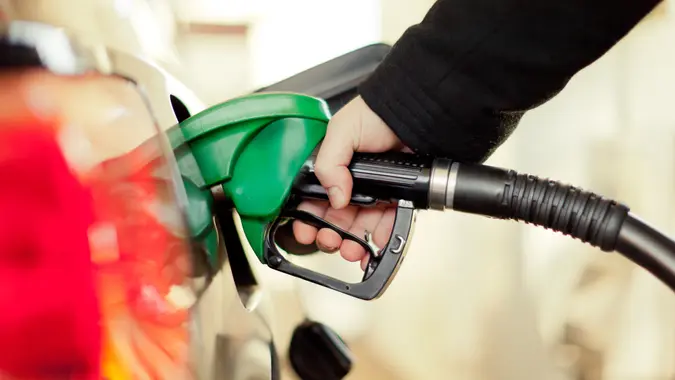An Oil Supply Shortage Is Coming — What That Means for Your Wallet at the Gas Pump

Commitment to Our Readers
GOBankingRates' editorial team is committed to bringing you unbiased reviews and information. We use data-driven methodologies to evaluate financial products and services - our reviews and ratings are not influenced by advertisers. You can read more about our editorial guidelines and our products and services review methodology.

20 Years
Helping You Live Richer

Reviewed
by Experts

Trusted by
Millions of Readers
Occidental Petroleum (Oxy) is one of the largest oil and gas producers in the U.S., and a major money-maker for investors such as Warren Buffett. Recently, Oxy’s CEO predicted a shortage of crude oil, the source of automotive gasoline, by 2025.
Be Aware: 6 Gasoline Brands That Are Wastes of Your Money
This may seem surprising, given that Occidental’s CEO also said the U.S., Canada, Brazil and Guyana are producing “record high volumes [of crude oil].” Both these statements can be true, because, while these countries may be producing an abundance of oil, they aren’t producing enough to replace the crude oil reserves. Falling reserves will result in an oil supply shortage. A shortage will impact the economy overall.
At a personal level, here’s what the coming oil supply shortage could mean for your wallet at the gas pump:
- Higher gas prices: The United States relies on imports of crude oil to make up for any shortfall in domestic production. Americans can expect the price at the pump to shift based on the supply and prices in the global crude oil market. Presently, this is expected to be an upward shift that will cost you more at the pump.
- Rising electric vehicle sales: As gas prices rise, electric vehicles will look desirable to more consumers despite their higher purchase cost. The question for your wallet will be whether buying an electric vehicle saves you enough money compared to paying for gas for your conventional vehicle.
- Fewer trips: Higher gas prices will have a negative impact on consumer behavior. With each tank costing more money, consumers on a budget will be forced to make fewer trips. Feeling constrained will also cause consumers to take a more pessimistic view of the economy. This, in turn, will impact how ready consumers are to make larger purchases for things like homes.
- Less in your wallet: Higher prices at the pump also mean less money in your wallet for other purchases like food, rent or entertainment. Each person who cuts back, even “just a bit,” to stay within their budget causes lower sales that negatively impact the economy.
- Lower profits: Freelancers who rely on transportation gigs like Uber or DoorDash as a source of income might find the refueling costs too much, lowering their net profit. This in turn may force them to look elsewhere for jobs that don’t have them inherently visiting gas stations as often.
 Written by
Written by  Edited by
Edited by 

























